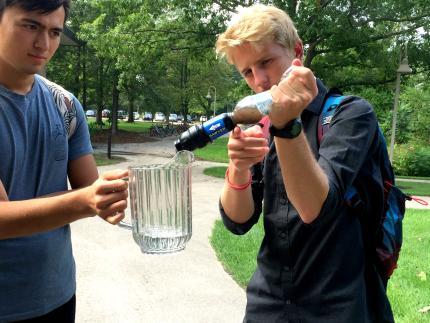Calvin College Study Plays Key Role in Clean Water Project

Calvin College students Matthew Bone (left) and Jamison Koeman (right) use the Sawyer PointONE water filter to change dirty river water into clean drinking water on Calvin College’s campus.
Students from Calvin College in Grand Rapids, Mich. played an integral role in a research project this summer that could lead to profound public health advancements on a global scale.
In partnership with Florida-based Sawyer International and Texas-based The Last Well, five Calvin College students collected, analyzed and mapped data that shows the distribution of Sawyer PointONE water filter systems in Liberian households is drastically improving the health of nearly a million people in Liberia. The three-pronged partnership is part of the team that aims to bring safe, clean water to the entire country of Liberia by 2020.
To achieve this goal, the Last Well is on the ground in Liberia distributing nearly 120,000 donated Sawyer PointONE water filter systems in communities and rural areas in Liberia. They are also teaching Liberians how to use and clean the filters and tracking the results through the GIS system. When the mission is complete in two years, Liberia will be the first developing country with clean water from one border to another.
“We are grateful for the partnership with Calvin College and the Clean Water Institute of Calvin College and appreciate the dedication and hard work the students and professors there have put into this project,” said Darrel Larson, international director of Sawyer Products. “The work they are doing to help us in our clean water endeavor could potentially have a profound global effect beyond Liberia’s borders.”
Since the effort began in 2009, there have been over 45,000 filters funded and placed in Liberia households within five of the country’s 15 counties. Another 33,000 filters have been funded and ready to be placed in homes this year, while the remaining 40,000 or more filters still need funding for placement in 2019 and 2020.
With the support of Calvin College and Sawyer, The Last Well is well on its way in achieving its goal of ensuring everyone in Liberia is within a 15-minute walking distance to a clean water source by 2020.
“Water is an extremely important resource. It is necessary for life and if it is not clean, it can strike you with disease,” said Jamison Koeman, a Calvin senior studying public health. “I use a lot of water on a daily basis, often times without thinking. Thinking back on my daily use of water, I can't fathom what it would be like to have to think about how I was going to get my water each day, and, if it would get me sick.”
Koeman is among the group of Calvin students — majoring in public health, mathematics and statistics and geography — selected to conduct research for the united cause. The college’s geography students worked on a GIS mapping application for Sawyer, which illustrates the locations of the water filters, health effects in the distribution area and basic demographic information, while the mathematics and statistics team acted as data detectives and analyzed the data, and the public health team interpreted the data and deciphered how it correlates to the health of Liberians.
As part of the project, Koeman wrote a case study with Calvin College associate professor and research mentor Kristen Alford about how the partnership between Sawyer, The Last Well and the college has been beneficial for the project’s mission in Liberia, and how this approach can lead to dynamic changes globally. It will be submitted for publication in the Christian Journal for Global Health.
“These partnerships hold potential for sustainable work that can provide lasting change in alleviating population health problems,” he said. “But partnership work in global health also holds the potential for detrimental change if sustainability is not accounted for.”
Alford, Calvin College associate professor of public health and social work, is astounded by the health improvements they have reported from the water filtration distribution in Liberia.
Based on surveys from 24,600 Liberian households, 12 percent of children under 5 years old experienced diarrhea before receiving Sawyer water filters. In addition, 10 percent of those 5-17 years old and 11 percent of those 18 and over also exhibited similar symptoms.
After using the water filter for six to eight weeks, preliminary findings reveal diarrhea had been reduced significantly in those households: Only about 1 percent of children under 5 years old and less than 1 percent of those 5-17 years old and less than 1 percent of those 18 years and over reported having diarrhea in the past two weeks.
“What’s exciting to us is seeing that these kids in Liberia who wouldn’t have these opportunities to grow and thrive, are now having these opportunities,” Alford said. “Anytime you see a child not only being able to live, but to live well because of something that seems pretty simple, like the distribution of one water filter to their household, that’s exciting. This is going to be a major change for the world.”
Sawyer was founded in 1984, Sawyer has been at the forefront of innovation in water filtration, insect repellent, sunscreen, and first aid. Not only are Sawyer’s filters one of the most popular on the trail, they are being used in over 80 developing countries to provide people with clean drinking water. The majority of Sawyer’s products are proudly made in the USA in Safety Harbor, Florida. For more information, visit https://international.sawyer.com/


